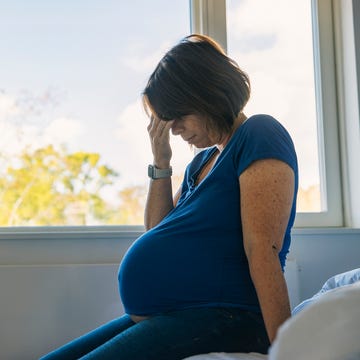If you think your typical weeklong period is a suckfest, please go talk to Reddit user Mrs_MooseJuice, who volunteered herself for an AMA on /r/TwoXChromosomes yesterday after she menstruated for 57 days straight. Hear that? It's the sound of uteruses exploding everywhere.
Mrs_MooseJuice went on to explain that she and her doctors think the culprit may have been a Depo-Provera shot, an injectible method of birth control, but she's still not quite sure. Nonetheless, she was eventually able to stop the bleeding with the help of the pill. Still, perhaps one of the most alarming things we learned by reading this whole thread (of course we did) is that this is not THAT abnormal—in fact, a couple of other commenters mentioned that they had had similar issues with hormone-based contraceptive measures. Another woman, who had also gotten the Depo-Provera shot, said her period went on for seven months. SEVEN. MONTHS.
Though the /r/TwoXChromosomes community is apparently very knowledgeable and helpful, we still had many, many questions. Like, "Is this actually normal?" "Could she die from this?" and just, "WHAA??!" So we called on New York City-based OB/GYN Fahimeh Sasan, DO, who says that while not life-threatening, menstruating for such an extensive period of time is definitely not something to ignore (not that you um, could).
"Some women will have prolonged bleeding or spotting when they initiate some forms of contraception, especially progesterone-only types such as Depo Provera, Implanon, or an IUD," she says. "Depo Provera can cause prolonged spotting (bleeding is usually light and not like a period), especially after the initial administration. The adjustment period is about three months. Usually after the initial dose, the spotting does stop and most women will either have no periods, or very light and short periods." She adds that usually the major risk of bleeding for so long is a loss of iron, which can cause a variety of other issues from anemia to weakened bones. (Mrs_MooseJuice did say on Reddit that her iron levels had dipped.)
The most common treatment to put an end to the misery is estrogen tablets, which are taken for seven to 14 days. That being said, Sasan notes that if you experience a prolonged period, birth control might not be the only culprit. Poly-cystic ovarian syndrom (or PCOS), uterine fibroids, and endometrial cancer can also cause excessive bleeding.
Either way, the grand takeaway is to see a doctor, please, if you realize that your monthly party has been raging on for a little too long (like two weeks or more). "The most important message is that any women with prolonged bleeding—regardless of their contraception status—should see their gynecologist for evaluation and appropriate treatment," Sasan says.













